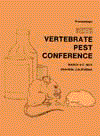Vertebrate Pest Conference: Proceedings

Vertebrate Pest Conference Proceedings: 6th (1974)
Date of this Version
March 1974
Document Type
Article
Abstract
A chemosterilant, mestranol, was administered to three populations of Richardson's ground squirrel in southeastern Alberta. Mestranol was given to all squirrels in one plot, to only 50 percent in another plot, while a third plot remained as control. In all plots social behavior and population dynamics were followed over two seasons by live trapping and visual observations. Mestranol sterilized all females who received the drug shortly before or in early pregnancy; accordingly the birth rates were reduced. Levels of total aggression were also reduced but increased survival and immigration rates nullified the effects of the treatment during the first season. During the second season, low birth rates due to repeated treatment in one plot and to adult emigration and unknown causes in the other, were not compensated for by immigration. As a result of the repeated mestranol treatment and in one case also of adult emigration, the numbers of squirrels were reduced in the vicinity, thus limiting potential immigration in the treated plots. As a consequence both treated populations crashed demonstrating the effectiveness of mestranol.

